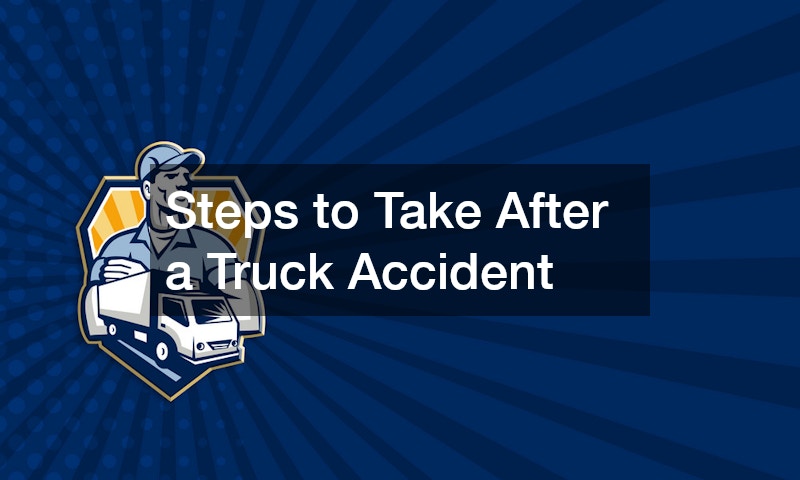Truck accidents pose significant dangers on the road, often leading to devastating consequences for all parties involved. These risks are compounded by the sheer size and weight of trucks compared to passenger vehicles. Understanding the dynamics of sharing the road with trucks, knowing the causes of accidents, and being prepared for what to do in the event of one can make all the difference in improving safety and reducing risks.
The Unique Challenges of Sharing the Road with Trucks

Sharing the road with trucks requires heightened awareness due to their unique operational characteristics. Trucks can weigh up to 80,000 pounds when fully loaded, making them harder to maneuver and stop. Their size creates large blind spots on all sides, commonly referred to as “no-zones,” where smaller vehicles can easily disappear from a truck driver’s view.
Another challenge is the truck’s limited braking capability. Unlike cars, trucks need much more distance to come to a complete stop. In inclement weather, this stopping distance increases significantly, raising the likelihood of rear-end collisions. Furthermore, high winds can destabilize trucks, especially when they are lightly loaded or pulling empty trailers, causing them to drift unexpectedly. Drivers of smaller vehicles should also be cautious of sudden changes in road conditions, as trucks can easily get caught in situations requiring off-road recovery, making them even more difficult to manage.
Common Causes of Truck Accidents
Understanding the causes of truck accidents is crucial in preventing them. Truck accidents often involve multiple factors, some of which are unique to the trucking industry due to the size, weight, and operational nature of large commercial vehicles. The following are some of the most common causes:
Driver Fatigue:
One of the leading causes of truck accidents is driver fatigue. Truck drivers often face long hours behind the wheel, sometimes driving for up to 11 hours a day, as allowed by federal regulations. While these regulations are in place to protect drivers and the public, the reality is that drivers frequently push the limits of these hours to meet delivery deadlines. This exhaustion can significantly impair a driver’s reaction time and decision-making abilities.
Fatigue makes it more difficult for drivers to maintain focus, increasing the chances of falling asleep at the wheel or failing to notice critical hazards on the road. In some cases, drivers may even resort to substances that impair their judgment, much like how DUI attorneys often handle cases where impaired driving leads to accidents. This creates a dangerous environment for everyone on the road.
Distracted Driving:
Distractions are not just a concern for passenger vehicle drivers; truck drivers can also be vulnerable to them. Truck drivers may engage in distractions such as texting, making phone calls, or adjusting their GPS. Eating and drinking, while seemingly harmless, can also divert attention away from the road. These distractions impair a truck driver’s ability to react promptly to traffic signals, other vehicles, and sudden changes in road conditions. Given the size and momentum of trucks, even a brief lapse in attention can result in catastrophic accidents.
Improper Loading:
Truck accidents can also occur due to improperly loaded or balanced cargo. When a truck is overloaded, or when the weight distribution is uneven, it can significantly affect the truck’s stability. During sudden stops, sharp turns, or high-speed maneuvers, an imbalanced load can cause the truck to tip over or lose control. This can result in the truck crashing into other vehicles or even blocking entire lanes on highways, creating a massive hazard for other drivers. Cargo must be properly secured to prevent shifting during transit, which is why both drivers and shipping companies are held accountable for loading practices.
Mechanical Failures:
Trucks are complex machines that require regular maintenance to operate safely. Mechanical failures, such as brake malfunctions, tire blowouts, and engine issues, are frequent causes of accidents. Brakes, in particular, are critical, as trucks rely on efficient braking systems to stop safely, especially given their massive weight. A malfunctioning brake system can lead to a complete loss of control, causing a dangerous collision.
In some instances, drivers may be unaware of mechanical issues or may neglect necessary maintenance due to time constraints or financial pressures. If engine problems arise, such as a failure in the truck’s performance, a truck engine overhaul may be required to restore its functionality and ensure safe driving. Regular vehicle inspections and maintenance checks are essential to preventing accidents caused by mechanical failures.
Weather Conditions:
Weather can play a significant role in the risk of truck accidents. Adverse weather conditions like rain, fog, snow, and ice can reduce visibility, impair traction, and make roads slippery, which are particularly hazardous for trucks due to their size and weight. Heavy rain and fog can obscure the truck driver’s view of the road, making it difficult to spot other vehicles or obstacles.
Icy roads increase stopping distances, making it harder for trucks to slow down or stop in time, especially in emergency situations. Truck drivers must adjust their driving behavior according to these conditions by reducing speed and increasing following distances, but even experienced drivers can struggle with extreme weather challenges.
How Truck Accidents Differ from Car Crashes

Truck accidents are markedly different from car crashes in terms of severity, legal implications, and aftermath. The significant size and weight disparity between trucks and passenger vehicles create a unique set of challenges that distinguish these types of accidents from more common car crashes.
Severity of Damage and Injuries:
One of the most notable differences is the severity of the damage and injuries. Trucks can weigh up to 80,000 pounds when fully loaded, while the average passenger car weighs only about 3,000 pounds. This size disparity means that in a collision, the smaller vehicle usually bears the brunt of the damage. Victims of truck accidents are often more likely to suffer catastrophic, life-altering injuries, such as spinal cord damage, traumatic brain injuries, and multiple fractures.
Unfortunately, fatalities are also more common in truck accidents compared to car crashes. For those who survive, the physical, emotional, and financial consequences can be overwhelming. In cases like these, car accident lawyers may help victims pursue compensation for long-term medical expenses, pain and suffering, and lost wages.
Complex Liability Issues:
Another key difference is the complexity of determining fault in truck accidents. While fault in a car accident is typically clear-cut—often being attributed to one or the other driver—truck accidents involve multiple parties. The truck driver, trucking company, maintenance contractors, cargo loaders, and even third-party logistics providers may all bear some responsibility. This makes liability much more complicated.
For example, if a truck accident is caused by poor vehicle maintenance, the trucking company or maintenance contractor may be found at fault. In such cases, victims may need to work with a truck accident attorney to be fairly compensated for their truck accident injuries.
Regulatory Oversight:
Trucking is subject to stringent federal and state regulations designed to keep the roads safe. These regulations include hours-of-service rules that limit how long a truck driver can be on the road, weight limits for vehicles, and mandatory inspections for maintenance.
Violations of these regulations, such as driving beyond the legal limit or failing to properly secure cargo, can be crucial factors in determining fault and liability in truck accidents. When these regulations are violated, they can significantly impact legal claims and serve as evidence in the pursuit of justice for accident victims.
Tips for Staying Safe on the Road

While truck accidents can have catastrophic outcomes, drivers can take proactive steps to reduce the risks.
Avoid Blind Spots:
Always stay out of a truck’s “no-zones,” which are the areas around a truck where the driver cannot see you. If you can’t see the truck driver in their side mirror, they likely can’t see you. Keep your distance and be aware of these blind spots, particularly on the sides and rear of large trucks.
Give Trucks Room:
When driving near a truck, give them plenty of space. This is especially important on inclines, where trucks may roll back slightly, or when passing, as trucks take longer to stop. Allow for more room when merging in front of a truck, as it may not be able to stop as quickly as a smaller vehicle.
Be Mindful When Passing:
Always signal clearly and pass promptly. Do not linger beside a truck, as their size may obstruct their view of your vehicle. Make sure you’re visible in the truck driver’s mirrors before attempting to pass, and always complete the maneuver as quickly as possible.
Stay Predictable:
Avoid sudden lane changes or braking when driving near trucks. Sudden movements can limit a truck driver’s ability to react in time. Maintaining a steady pace and predictable actions helps drivers of large trucks anticipate your next move and react accordingly.
By practicing defensive driving and staying alert, you can significantly reduce your chances of being involved in a truck-related collision. Prioritizing auto care can also keep your car in top condition, helping you react safely in challenging road conditions.
What to Do If You’re Involved in a Truck Accident
In the unfortunate event of a truck accident, taking immediate and measured steps can protect your well-being and legal interests.
Ensure Safety:
First, move to a safe area if possible to avoid further collisions. Turn on your hazard lights to alert other drivers and immediately call emergency services to report the accident and request medical assistance.
Seek Medical Attention:
Even if injuries seem minor, it’s crucial to get evaluated by a medical professional. Some symptoms of serious truck accident injuries, such as internal injuries or whiplash, may not appear until hours or even days after the accident.
Document the Scene:
Take clear and detailed photos of the vehicles, the damage, and the surrounding area. These images will serve as crucial evidence for insurance claims and legal proceedings, particularly if there are disputes regarding fault or the extent of the damage.
Gather Information:
Exchange essential information with the truck driver, including their name, driver’s license number, and insurance details. Additionally, make sure to get the trucking company’s contact information, as they may be held liable for the accident.
Speak with Witnesses:
If there are witnesses to the accident, make sure to collect their contact details and statements. Eyewitness testimony can be invaluable in establishing fault and providing an accurate account of the events leading up to the crash.
Call a Towing Company:
If your vehicle is immobile after the accident, contact professional towing services for assistance. If the truck is also disabled, truck towing services can help safely remove the vehicles from the scene and prevent further traffic disruptions.
By following these steps, you can guarantee your safety and preserve the necessary documentation to protect your legal rights in the aftermath of a truck accident.
Steps to Take After a Truck Accident

Once the immediate aftermath is addressed, there are additional steps to take to safeguard your rights.
File a Police Report:
A detailed police report is essential as it can serve as critical evidence for your case. Make sure that all relevant information, including the circumstances of the accident, vehicle damages, and any statements from involved parties, is accurately recorded. This documentation will be helpful in establishing fault and supporting insurance claims.
Notify Your Insurance Company:
Promptly report the accident to your insurance company. Stick to the facts of the incident and avoid admitting fault, as liability in truck accidents can be complex. Your insurer will begin the process of evaluating the damage and handling your claim, so clear communication is vital. If the truck’s damage is significant, make sure to inform your insurance about any potential delays or repair requirements.
Consult an Attorney:
Truck accident cases can be legally complex, so seeking guidance from an attorney experienced in handling these types of claims is crucial. A truck accident attorney can help you navigate the claims process, deal with multiple parties involved (like the truck driver and the trucking company), and recover compensation for medical bills, lost wages, pain and suffering, and other damages.
Follow Through on Medical Care:
Even if you feel fine initially, following through on medical care is essential for your recovery. Adhering to your treatment plan not only helps you heal but also strengthens your case if you decide to pursue a personal injury claim. Documenting all medical visits and treatments is crucial for proving the extent of your injuries.
Get Vehicle Repairs:
After addressing medical concerns and legal matters, it’s time to consider vehicle repairs. If your car was involved in the accident, visit trusted auto collision shops for an estimate and repairs. Make sure all damage is fully assessed to avoid future issues.
Following these steps will help protect your rights, manage the aftermath of the accident, and ensure you receive the appropriate legal and medical care.
The Road Ahead: Advocating for Safer Highways
Improving safety on highways involves a collective effort from drivers, policymakers, and the trucking industry.
Stronger Regulations:
Advocating for stricter enforcement of hours-of-service rules and regular vehicle inspections can significantly reduce risks associated with truck accidents. Ensuring that trucks are well-maintained and drivers are well-rested is crucial to keeping highways safer.
Enhanced Driver Training:
Providing better training for truck drivers, especially on handling adverse weather and road conditions, can prevent accidents. Specialized training programs that focus on defensive driving, vehicle handling, and emergency response are essential to promoting safety.
Public Awareness Campaigns:
Educating the public about the dangers of sharing the road with trucks is an effective way to foster safer driving behaviors. Campaigns can raise awareness about blind spots, safe passing distances, and the challenges truck drivers face, ultimately encouraging more respectful and cautious driving around large vehicles.
Technology Integration:
Technology plays a pivotal role in enhancing safety on the roads. Advanced driver-assistance systems (ADAS), such as lane-keeping assist and automatic emergency braking, can help prevent collisions. Additionally, as part of improving safety, some trucking companies have started exploring commercial truck customization options to enhance visibility and maneuverability, further contributing to accident prevention.
Through a combination of regulation, training, awareness, and technology, we can work towards safer highways for all road users.
In Summary
Truck accidents represent a serious threat on today’s roads, but increased awareness and proactive measures can significantly mitigate risks. By understanding the unique challenges of sharing the road with trucks, recognizing common causes of accidents, and knowing how to respond effectively, all drivers can contribute to safer highways. It’s crucial for individuals, industries, and governments to work together toward this goal, ensuring that every journey is a safe one.